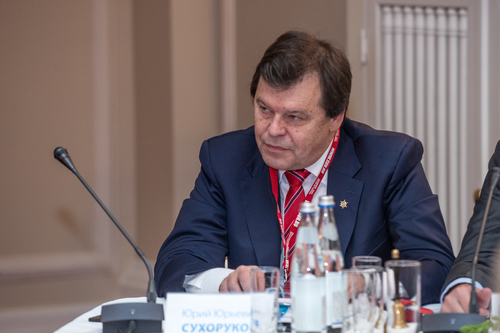ÐÎÑÑÈÉÑÊÈÉ ÏÐÎÔÅÑÑÈÎÍÀËÜÍÛÉ ÑÎÞÇ ÌÎÐßÊÎÂ
SEAFARERS' UNION OF RUSSIA
A NON-UNIONIZED SEAFARER
IS AN UNPROTECTED SEAFARER
Back
Tangible consequences of visa restrictions for Russian seafarers will have an impact in six months

Notwithstanding current sanctions Russian seafarers are still in demand by European shipowners. Today about 30 thousand Russian seafarers work on board European shipping companies' vessels ensuring the smooth operation of supply chains. However, the situation may change radically if visa restrictions for Russian citizens, introduced by the European Union in mid-September this year, are imposed on Russian seafarers. This was stated by the head of the Seafarers' Union of Russia, Yury Sukhorukov at a meeting of the Maritime Transport Section of the European Transport Workers' Federation (ETF MTS).
“The Schengen visas available to Russian seafarers allow them to travel freely throughout most EU countries for the purpose of crew change in European ports. However, under entry restrictions for Russian citizens in Europe, as seafarers’ visas expire, problems with crew changes will become inevitable. Tangible consequences of this will have an impact in six months or a year maximum,” – Yury Sukhorukov warned.
He also said that European politicians made a number of exceptions for the issuance of Schengen visas to transport workers, but, for unknown reasons, did not include merchant marine seafarers in this list. “We have to give them a clear message: if you want to keep the time-tested supply chains intact and to guarantee the smooth transportation of goods by sea, you should lift the restrictions for seafarers. Not only seafarers will thank you for this, but also citizens of your own countries either", – Yury Sukhorukov emphasized.
According to the International Chamber of Shipping (ICS), Russian seafarers make up about 10.5% of the world's merchant marine workers, Ukrainian seafarers make up more than 4%. Most of them are highly qualified marine officers having excellent professional training. All of them are now facing enormous difficulties in their work. “We know this because we regularly visit ships calling at our ports, ؘ– told Susana Ventura, representative of the largest German trade union, Ver.di. – Quite recently, as part of the Baltic Action Week (an annual action of maritime trade unions to fight flags of convenience – editorial comment), we inspected dozens of merchant ships, the crews of which consisted of both Russian and Ukrainian seafarers. In addition to the inability to go ashore due to ongoing quarantine restrictions, – which is a common practice today in many, even large, companies – they face difficulties with crew changes and getting wages in foreign currency.”
Maritime unions stand in solidarity: in the face of a growing shortage of maritime specialists – it is unacceptable to create additional obstacles to the recruitment of such a significant number of qualified seafarers. According to the EU funded SKILLSEA project, from 2010 to 2015, the number of officers increased by 25%, while from 2015 to 2021 this growth was only 11%. Experts predict that the situation will only get worse.
Under imposed sanctions seafarers face difficulties getting wages which are calculated in dollars or euros. As a rule, foreign companies dealt with foreign currency accounts with domestic banks, many of which fell under sanctions. As a result, foreign shipowners are currently seriously limited in their ability to transfer wages through Russian banks. Seafarers can also receive wages in cash on board the vessel, but today seafarers’ monthly wages of is up to USD10,000,– making it next to impossible to carry such large-amounts of money across the border when returning home, – for security reasons as well.
Our European partners have a clear understanding that it is impossible to replace Russian seafarers delivering goods and commodities to provide normal functioning of the European Union, – Yury Sukhorukov stressed. – Therefore, it is necessary to give seafarers an opportunity to freely cross the borders of the European Union and to facilitate for them, as much as possible, the process of obtaining Schengen visas. Also, we urge to guarantee the transfer of salaries to seafarers' accounts in several Russian banks, which the European Commission can determine, – also by doing it independently".
That is why the experts decided to act proactively and not to wait for the situation to escalate. The issues raised by the SUR President were discussed at next meeting of the Sectoral Social Dialogue Committee for Maritime Transport, which includes representatives of seafarers through the ETF Maritime Transport Section and representatives of European shipping companies through the European Community Shipowners' Associations (ECSA). The participants of the meeting supported the fair demand of the Russian party: the Co-Chairs of the Committee, General Secretary of the Nautilus International, Mark Dickinson, and Policy Director for Employment and Legal at the UK Chamber of Shipping, Tim Springett, will forward a joint appeal to the European Commission and the European Parliament with a proposal to grant Russian seafarers a right to get Schengen visas freely for the sake of effective crew changes in European ports. The ETF promised to keep the process under control.
The meeting of the ETF maritime transport section with the participation of trade union representatives from Russia, Great Britain, Sweden, Norway, Greece, Italy, Germany, France, Croatia and other countries marked the first such meeting in the current period. – During the ETF Congress in May the delegates elected new members of the ETF – governing bodies, including the Maritime Transport Section. Let it be reminded that the representatives of the Youth Committee of the Seafarers' Union of Russia became the members of the Section, while the SUR Chairman, Yury Sukhorukov, was elected Vice Chair of the ETF Maritime Transport Section.
Up
